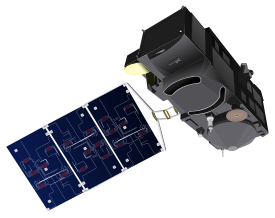 Vector drawing of the Sentinel-3 | |||||||||||||||||
| Mission type | Earth observation | ||||||||||||||||
|---|---|---|---|---|---|---|---|---|---|---|---|---|---|---|---|---|---|
| Operator | ESA · EUMETSAT | ||||||||||||||||
| COSPAR ID | 2018-039A | ||||||||||||||||
| SATCAT no. | 43437 | ||||||||||||||||
| Website | Sentinel-3 (ESA) | ||||||||||||||||
| Mission duration | Planned: 7 years Elapsed: 6 years, 7 months | ||||||||||||||||
| Spacecraft properties | |||||||||||||||||
| Spacecraft type | Sentinel-3 | ||||||||||||||||
| Bus | Prima | ||||||||||||||||
| Manufacturer | Thales Alenia Space[1] | ||||||||||||||||
| Launch mass | 1,250 kg (2,756 lb)[2] | ||||||||||||||||
| Dry mass | 1,150 kg (2,535 lb)[3] | ||||||||||||||||
| Dimensions | 3.9 × 2.2 × 2.2 m (12.8 × 7.2 × 7.2 ft)[2] | ||||||||||||||||
| Power | 2,300 watts[3] | ||||||||||||||||
| Start of mission | |||||||||||||||||
| Launch date | 25 April 2018, 17:57:51 UTC[1] | ||||||||||||||||
| Rocket | Rokot/Briz-KM | ||||||||||||||||
| Launch site | Plesetsk Cosmodrome, Site 133 | ||||||||||||||||
| Contractor | Eurockot Launch Services | ||||||||||||||||
| Orbital parameters | |||||||||||||||||
| Reference system | Geocentric | ||||||||||||||||
| Regime | Sun-synchronous | ||||||||||||||||
| Semi-major axis | 7,180.77 km (4,461.92 mi) | ||||||||||||||||
| Eccentricity | 0.0001027 | ||||||||||||||||
| Perigee altitude | 801.90 km (498.28 mi) | ||||||||||||||||
| Apogee altitude | 803.38 km (499.20 mi) | ||||||||||||||||
| Inclination | 98.6276° | ||||||||||||||||
| Period | 100.93 min | ||||||||||||||||
| RAAN | 183.84° | ||||||||||||||||
| Argument of perigee | 96.39° | ||||||||||||||||
| Mean motion | 14.26 rev/day | ||||||||||||||||
| Repeat interval | 27 days[4] | ||||||||||||||||
| Epoch | 25 April 2018, 20:50:15 UTC[5] | ||||||||||||||||
| Transponders | |||||||||||||||||
| Band | S band (TT&C support) X band (science data) | ||||||||||||||||
| Bandwidth | S band: 64 kbit/s uplink, 1 Mbit/s downlink X band: 2 × 280 Mbit/s | ||||||||||||||||
| |||||||||||||||||
Sentinel-3B is a European Space Agency Earth observation satellite dedicated to oceanography which launched on 25 April 2018.[1] It was built as a part of the Copernicus Programme, and is the second (after Sentinel-3A, launched 16 February 2016) of four planned Sentinel-3 satellites.
- ^ a b c Clark, Stephen (25 April 2018). "European environmental observer launched by Russian rocket". Spaceflight Now. Retrieved 25 April 2018.
- ^ a b "Copernicus: Sentinel-3". eoPortal. European Space Agency. Retrieved 25 April 2018.
- ^ a b "Satellite: Sentinel-3B". World Meteorological Organization. Retrieved 25 April 2018.
- ^ "Sentinel-3 › Mission Summary". European Space Agency. Retrieved 30 January 2016.
- ^ "Sentinel 3B - Orbit". Heavens Above. 25 April 2018. Retrieved 25 April 2018.